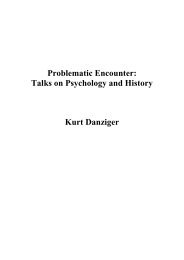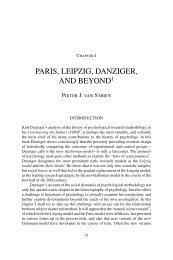The positivist repudiation of Wundt - Kurt Danziger
The positivist repudiation of Wundt - Kurt Danziger
The positivist repudiation of Wundt - Kurt Danziger
You also want an ePaper? Increase the reach of your titles
YUMPU automatically turns print PDFs into web optimized ePapers that Google loves.
THE POSITIVIST REPUDIATION OF WUNDT 229<br />
seem to have had the greatest appeal for most <strong>of</strong> his psychological readers. See also Paul Tibbetts, “<strong>The</strong><br />
Doctrine <strong>of</strong> ‘Pure Experience’: <strong>The</strong> Evolution <strong>of</strong> a Concept from Mach to James to Tolman,” Journal <strong>of</strong> the<br />
History <strong>of</strong> the Behavioral Sciences 1 1 (1975): 55-66.<br />
49. Kiilpe, Outlines, p. 448.<br />
50. Ebbinghaus, Grundziige, pp. 584-585.<br />
51. Walter B. Pillsbury in Murchison, A History <strong>of</strong> Psychology in Autobiography, vol. 2 (New York:<br />
Russell and Russell, 1961), p. 270.<br />
52. Titchener, Textbook <strong>of</strong> Psychology, p. 367.<br />
53. Alfred Georg Ludwig Lehmann, Die Hauptgesetze des menschlichen Gef~hlslebens (Leipzig:<br />
Reisland, 1892); Friedrich Kiesow, “Versuche mit Mossos Sphygmamanometer Uber die durch psychische<br />
Erregungen hervorgerufenen Verhderungen des Blutdrucks,” Philosophische Studien 11 (1895): 41-60.<br />
54. Edward Bradford Titchener, Lectures on the Elementary Psychology <strong>of</strong> Feeling and Attention<br />
(New York: Macmillan, 1908), pp. 137-138.<br />
55. Edward Bradford Titchener, “Zur Kritik der <strong>Wundt</strong>’schen Gefiihlslehre,” Zeitschrift Jir Psychologie<br />
19 (1899): 321-326.<br />
56. Wilhelm <strong>Wundt</strong>, “Bemerkungen zur <strong>The</strong>orie der Geflihle,” Philosophische Studien 15 (1900): 149-182.<br />
57. Titchener’s “data” were in part based on the introspective jottings made by a student while going<br />
about his daily business!<br />
58. Wilhelm <strong>Wundt</strong>, Logik, 3d ed., vol. 3 (Stuttgart: Enke, 1908), p. 210.<br />
59. Ibid., p. 214.<br />
60. <strong>The</strong> “Gefilhlszentrum” is regarded as being identical with the “Apperzeptionszentrum.” See Wilhelm<br />
<strong>Wundt</strong>, Viilkerpsychologie, vol. 1 (Leipzig: Engelmann, 1900), p. 62.<br />
61. Mach, Sensations, p. 26.<br />
62. Ibid., p. 22.<br />
63. Although Mach himself had been inclined to regard even pleasure and pain as sensations, the Machians<br />
among the psychologists recognized that they must be given a special status. <strong>The</strong> reason, as Ebbinghaus<br />
points out (Grundziige, p. 543), lies in their role as determinants for the movements <strong>of</strong> the organism,<br />
including, in the case <strong>of</strong> man, the movement <strong>of</strong> ideas. Pleasure and pain therefore constitute the noneliminable<br />
residue <strong>of</strong> complex central selecting and directing processes.<br />
64. Titchener, Lectures, p. 159.<br />
65. Edward Bradford Titchener, Lectures on the Experimental Psychology <strong>of</strong> the Thought Processes<br />
(New York: Macmillan, 1909), p. 36. According to Boring, Titchener was eventually persuaded that<br />
even the last remnant <strong>of</strong> the category <strong>of</strong> feeling, pleasantness-unpleasantness, could be reduced to sensation.<br />
See Edwin G. Boring, <strong>The</strong> Physical Dimensions <strong>of</strong> Consciousness (New York: Century, 1933), pp. 18-19.<br />
66. <strong>Wundt</strong>, “Uber naiven und kritischen Realismus.”<br />
67. Edward Bradford Titchener, An Ourline <strong>of</strong> Psychology (New York: Macmillan, 1896), p. 13.<br />
68. Ibid., p. 15.<br />
69. <strong>Wundt</strong>, Logik, vol. 3, 1908, p. 193.<br />
70. Ibid., p. 271.<br />
71. Looking back on his achievement at the end <strong>of</strong> his life, <strong>Wundt</strong> arrives at the following succinct statement<br />
<strong>of</strong> his essential endeavour: “Whereas physiology believed it had to restrict itself to the strictly delimited<br />
area <strong>of</strong> sensation, it became my aim, on the contrary, to show, wherever possible, how the elementary<br />
processes <strong>of</strong> consciousness, sensations and associations, everywhere already reflected the mental life in its<br />
totality.” Wilhelm <strong>Wundt</strong>, Erlebtes und Erkanntes (Stuttgart: Kr6ner, 1920).<br />
72. Wilhelm <strong>Wundt</strong>, “Uber reine und angewandte Psychologie,” Psychologische Studien 5 (1909): 1-47.<br />
73. In the preface to the third edition <strong>of</strong> the Logik. <strong>Wundt</strong>, 1908.<br />
74. It is pr<strong>of</strong>oundly misleading to consider Mach an “ancestor” <strong>of</strong> Gestalt psychology, as is sometimes<br />
suggested (for example, Boring, Experimental Psychology, p. 590). For Mach, the sensation <strong>of</strong>-the whole<br />
was simply an additional element added on to the elements that constituted the parts, a view that is the<br />
precise antithesis <strong>of</strong> the Gestalt doctrine about the relationship <strong>of</strong> parts and wholes. In their search for<br />
respectable ancestry some Gestalt psychologists occasionally read things into Mach that were not really<br />
there.<br />
75. This was one reason for <strong>Wundt</strong>’s emphatic rejection <strong>of</strong> anything resembling the doctrine <strong>of</strong> “mental<br />
chemistry” (see Logik, vol. 3, p. 270 ff.).<br />
76. From the point <strong>of</strong> view <strong>of</strong> a new systematic sociology, Max Weber took issue with <strong>Wundt</strong>’s conception<br />
<strong>of</strong> the appearance <strong>of</strong> value in cultural experience. While Weber agreed that values were <strong>of</strong> fundamental<br />
importance in social life, he treated them relativistically; <strong>Wundt</strong>’s approach, with its notion <strong>of</strong> a hierarchical<br />
development <strong>of</strong> objective values, Weber considered to be an expression <strong>of</strong> the nineteenth-century belief





